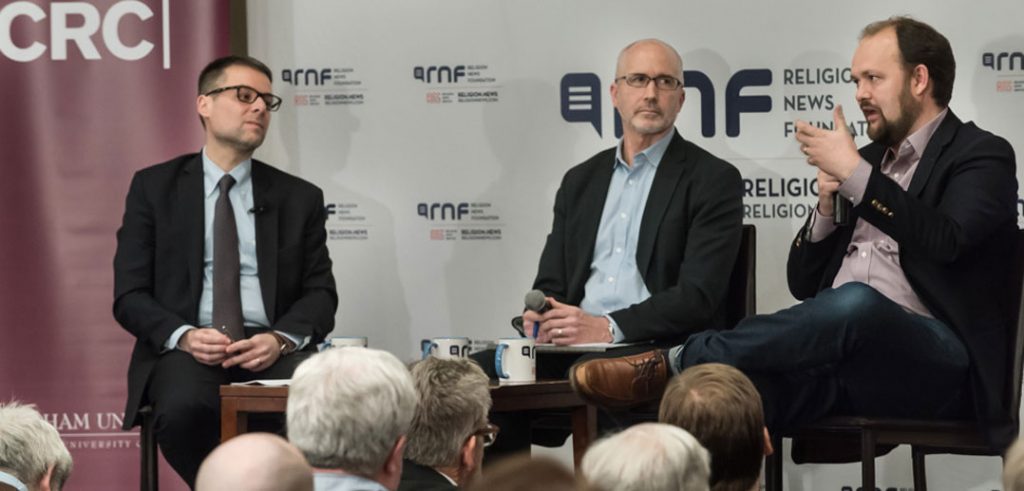When Pope Francis was elected the 266th Roman Catholic pontiff on March 12, 2013, his appointment began with three notable firsts: He was the first Jesuit pope, the first pope to take the name St. Francis of Assisi, and the first non-European pope.
Five years later, he continues to be the subject of discussions among Catholics for a host of reasons that have transcended his historic pontificate.
In “Francis@Five,” a Jan. 31 event sponsored by Fordham’s Center on Religion and Culture (CRC) and the Religion News Service, New York Times op-ed columnist Ross Douthat and Villanova University theology professor Massimo Faggioli debated how Francis’ apostolic, pastoral ministry has impacted the Catholic Church and what it could mean for its future.
Among the most controversial topics put on the table by moderator and CRC director David Gibson was Pope Francis’ 256-page, post-synodal apostolic exhortation Amoris Laetitia. In it, the pope implies that there are cases where divorced and remarried Catholics may receive Holy Communion.
His assertion sent shock waves through the Catholic world. It was also a source of contention among the evening’s speakers.
Douthat, one of America’s prominent conservative voices, argued that Pope Francis’ reflections in Amoris Laetitia present a crisis for the church.
“The church presumably has an obligation not to effectively evacuate its teachings in the name of pastoral flexibility,” said Douthat, who tackles the issue in his upcoming book, To Change the Church: Pope Francis and the Future of Catholicism (Simon & Schuster, 2018).
Though Pope Francis is often seen as a reformer, Faggioli pointed out that he doesn’t make decisions based on a decree. He said the pope’s legacy is ultimately about the teachings of Jesus.
“I don’t think an argument can be made about this pope undermining the teaching on marriage,” said Faggioli, who argued that differing views on marriage and divorce in North American and European societies can’t be discounted. “It’s more a cultural discomfort than a theologically grounded issue.”
For Douthat, Pope Francis’ passive stance on divorced and remarried Catholics is pushing many conservatives away from the church.
“In practice, it’s hard for me to see how that doesn’t evacuate the teaching…no matter how many times you insist that teaching remains in effect,” he said.
The Second Vatican Council
While Faggioli believes that the pontificate has initiated a shift of the Catholic Church that has theological, cultural, and political consequences, he said it also puts the Second Vatican Council into perspective.
“Francis is revealing different ways of implementing the Second Vatican Council and revealing instincts for a return to a pre-Vatican period for some,” said Faggioli, who has written extensively on John Paul II, Benedict XVI, and the council.
Douthat argued that the papacy has led to changes around contested issues of sexual ethics that weren’t permitted under John Paul II or Benedict XVI.
“It seems very hard to deny that all of those causes have been explicitly or implicitly advanced by the informal, non-explicit, heavily footnoted magisterium of this pope,” he said.
Continuity vs. Discontinuity
It’s important to note, said Douthat, that the Second Vatican Council happened before the social revolutions of the 1960s and at a time when there was no clear sense of what specific questions the church was facing.
“One of the striking things about the conservative-liberal Catholic debate—even within the West—is how much both sides assume the definitiveness of Vatican II,” he said.
“At some point, the church has to say definitely that ‘yes, this change has happened and it’s part of the spirit of Vatican II, but it’s a real change and we’re going to own it.’”
The scholars spoke to the question of whether the church can change. Faggioli argued yes, saying that Catholics have overestimated the issue of continuity. On divisive, hot-button issues like marriage and divorce, Pope Francis is hardly to blame, he said.
“This mess about marriage is not a product of Francis,” he said. “I don’t think it can be solved by accusing one pope, or cardinal, or bishop conference of tampering with Catholic teaching—it’s more complicated than that.”
And yet Pope Francis, said Douthat, has put himself in a position where he may be remembered as an “immense success or a tragic failure—with little room in between.” He questions whether the church is drifting toward an Anglican model of papal governance around issues of faith and morals, or a decentralization where Catholic teaching varies in different countries around the world.
“Things have not gotten better for the Eastern [Catholic] Church since Vatican II, and that to me is a sign that it’s a period of crisis,” he said.

